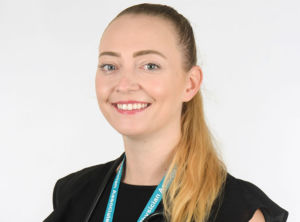This week is Physician Associate Week, raising the profile nationally of this interesting role, that has really started to take off in the NHS in the last few years.

To find out more about what Physician Associates do in the health service, we talked to Zoe Cooke, Lead Physician Associate in the Acute Frailty Team at Conquest Hospital.
“The role is quite often something that people haven’t heard of and can be misunderstood. Quite a few people think that the title is ‘Physician’s Associates’, and that we work as doctors’ assistants, but that isn’t right. We work alongside doctors to support their work to provide safe and effective patient care.”
Physician Associates are trained to the medical model and perform a number of functions that have traditionally been undertaken by qualified doctors. These include taking medical histories from patients, performing physical exams and diagnostic procedures; through to analysing test results, diagnosing illnesses and developing patient management plans, under the supervision of a consultant.
“There’s a lot of responsibility in the role,” says Zoe. “Patients and relatives are expecting you to make an accurate diagnosis and formulate a treatment plan under increasing time pressure. We work closely with other members of the multi-disciplinary team, and as we traditionally do not rotate in our roles, we form great working relationships with the permanent team members. It also means we provide a source of continuity for the team and patients.”
As you would expect from a role that makes important decisions in patient care, it isn’t straightforward to become a Physician Associate. All Physician Associates working in the NHS must have a health-related first degree, followed by two years of post-graduate study – including 1,600 hours of on-the-job training.
Zoe is one of the six Physician Associates working at the trust, with others working in stroke, oncology, acute frailty and acute medicine teams – providing their medical knowledge to help diagnose and treat patients in these complex disciplines.
“It’s really rewarding work and I really enjoy it,” says Zoe. “You really get involved in the fundamentals of a patient’s care and can make a real difference to their lives.”
If you are interested in training to be a Physician Associate, or in exploring how a Physician’s Associate could support the work of your team, you can email Zoe or find out more on the Health Careers website.
